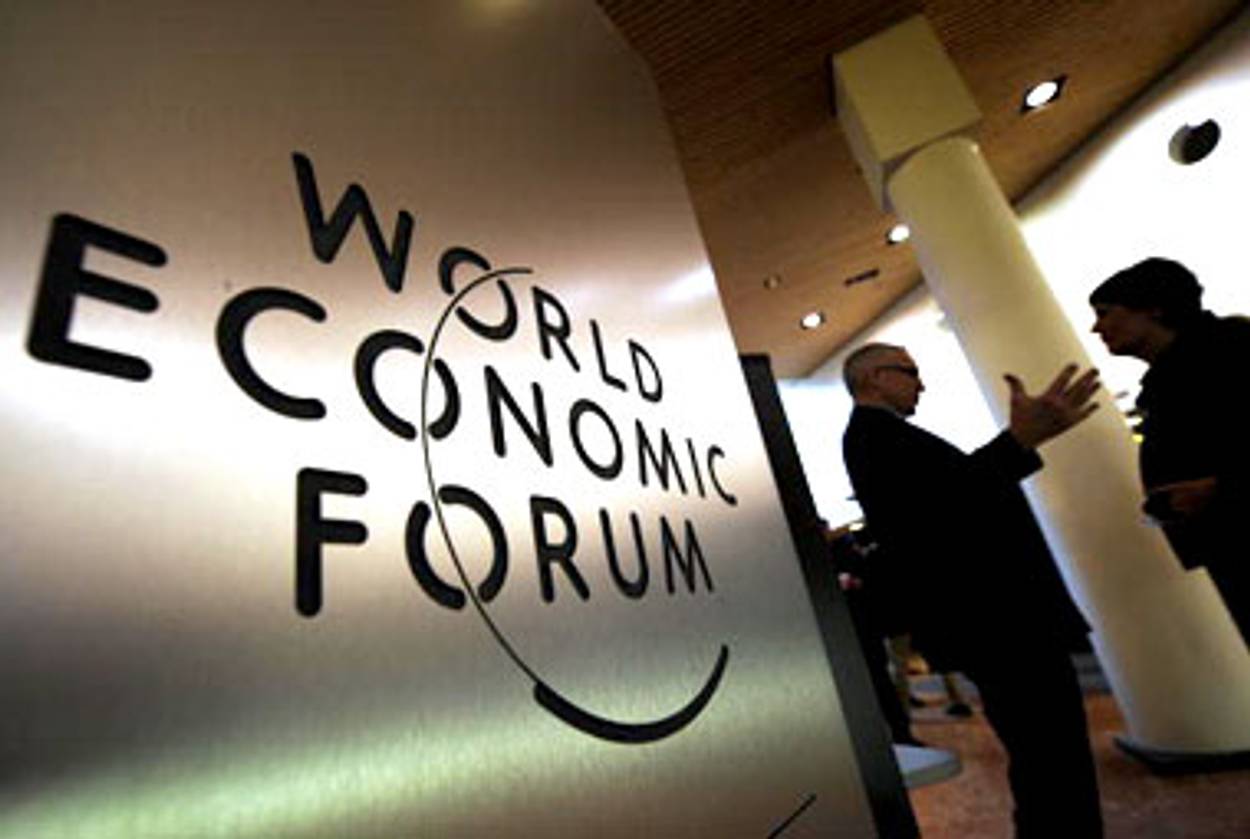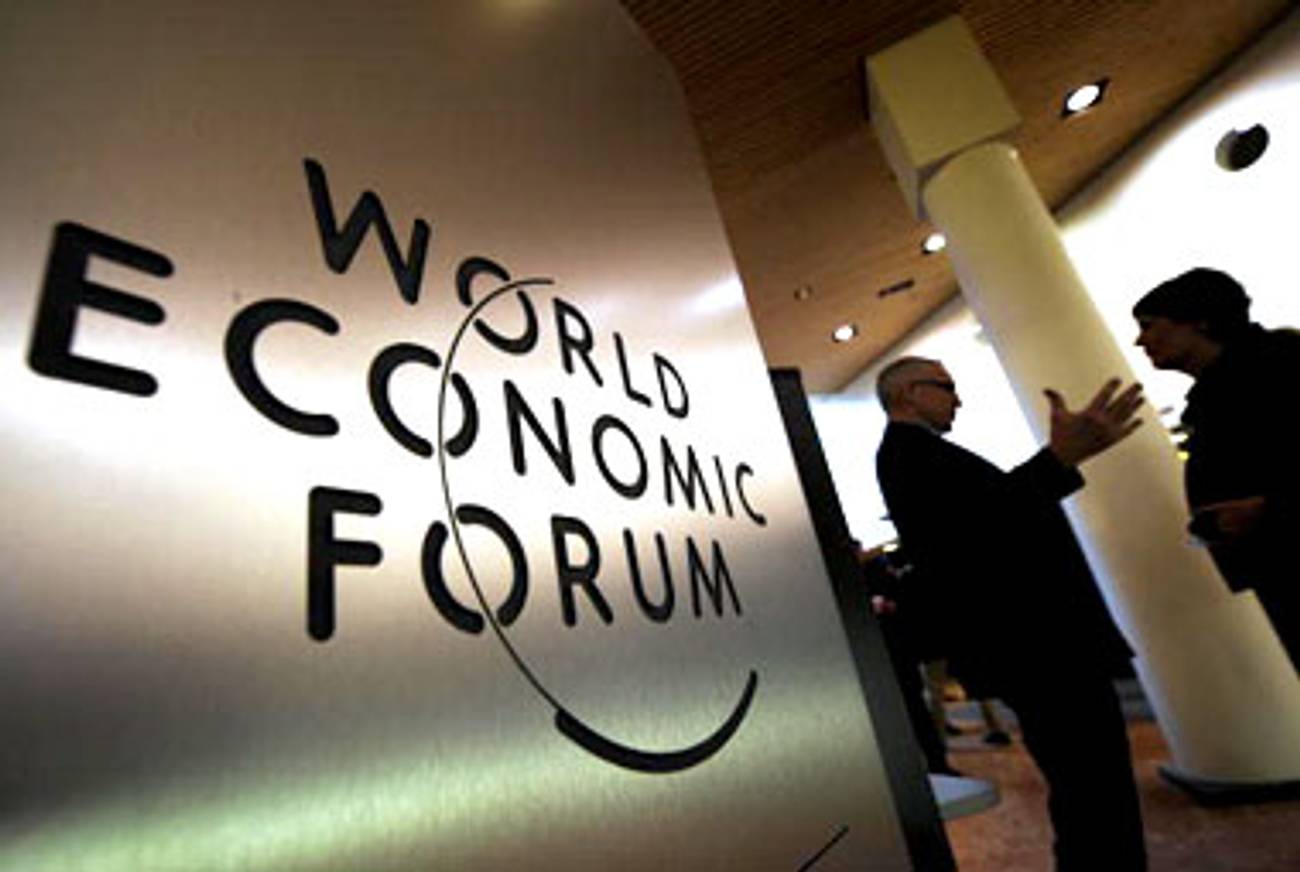Davos Shabbos
Friday-night dinner with the machers in Switzerland




Shabbat observance is something I prefer to do at home, with my family and friends. While traveling, I don’t seek a Chabad house for a Shabbat dinner, or blast out an email to see if a friend of a third cousin is in Beijing, or Tokyo, and wants to play host to a wandering Jew. But last week, while in Switzerland, I agreed to a last-minute Shabbat dinner in a hotel dining room with a few friends, a bunch of acquaintances, and some strangers whom I recognized. When Elie Wiesel began singing a slow, full-throated “Shalom Aleichem,” I knew this was would not be a usual Friday night.
I was attending the World Economic Forum in Davos, Switzerland, the annual gathering of the world’s great and good. It’s hard to think of a more godless gathering than the WEF. It’s in Switzerland, which generally frowns upon public displays of religiosity, and frowns upon non-Christian displays of religiosity in particular. (Its citizens recently approved a referendum banning the construction of minarets, thus forestalling any efforts to add to the four already there.) Davos is a resort devoted to sybaritic pursuits—skiing, eating, drinking. Walk up and down the main street, Promenade, and you’ll notice far more chocolatiers and luxury retailers than churches. As an ecumenical gathering devoted to reason, free trade, and the pursuit of profits and earthly improvement, the WEF is, if not hostile to religion, aggressively indifferent to it. In the Congress Center, the main hub of activity, signs point to a Prayer Room—a small chamber with an arrow pointing to Mecca. In three years I’ve never seen anybody go in or out of it. Davos Man doesn’t read the bible; he reads the Financial Times. Of course, religion and religious figures always occupy a few slots on the program—there’s always a panel involving a rabbi, a priest, and an imam. But religious figures come for the express purpose of breaking bread with people who don’t adhere to their faith.
Up there in the mountains at Davos, even the most deeply held clashes are set aside for a few days. Because there are few places to sit in the Congress Center, one day I found myself across from an Israeli industrialist, wearing blue jeans and blazer, who was sitting knee-to-knee with a correspondent from Lebanese media company An-Nahar, tapping on his laptop. This conviviality has limits, as Turkish Prime Minister Tayyip Erdogan demonstrated last year when he stomped out of a session with Shimon Peres. This year, normal order was restored. I attended one lunch where Peres, an echt Davos Man, sat at the same table with Palestinian Prime Minister Salem Fayyed, whom Peres later called “the Palestinians’ first Ben-Gurionist.”
In other words, the idea of segregating yourself along with coreligionists is contrary to the spirit of Davos. But it was Friday night, I was exhausted after three days of listening and writing, and a friend suggested I tag along to the Davos Shabbat dinner. The thought of institutional Swiss glatt kosher—a kind of harmonic convergence of dubious cuisines—wasn’t appealing. But as my eyes scanned from Elie Wiesel, his hands swaying gently, to Shimon Peres, to the 20-something social-media executive who led us in “Yerushalayim Shel Zahav,” to the other 15-odd tables filled with many faces I recognized, the food turned out to be secondary to the experience.
My table represented something of a cross section of Davos: the editor of Foreign Policy, two venture capitalists, a London-based executive at Google, the head of a large French industrial concern, a young management consultant. One table over was what I called the adult table—the head of one of the world’s largest private equity firms, an undersecretary of state, one of the best-known Jewish philanthropists. In many ways, it was a typical Davos event—high-level chattering, the exchanging of business cards.
But it was also highly atypical. Amid the ecumenicism, it was a bit jarring to see signs not just of sectarianism, but of my peculiar sectarianism. Black suits are common in Davos. Black yarmulkes are not. After the singing, and a Kiddush led by Jacob Frenkel, Israel’s former central banker, the chief rabbi of Tel Aviv and chairman of Yad Vashem, Rabbi Yisrael Meir Lau, gave a fiery, impassioned davar torah on the week’s portion, B’shalach. It tells the story of Amalek, who rose up to harry the stateless, friendless Jews on their way out of Egypt. (I can say with some certainty that this is probably the first time the story of Amalek has been told at Davos.) Sitting on European soil, in the German-speaking portion of Switzerland, amid Holocaust survivors, the story has its own resonance. Lau, the only member of his family to survive the camps, spoke of being liberated from Buchenwald on the same day Elie Wiesel was, in 1945. And he spoke with amazement at the fact that, within three years of that date, Israel rose as an independent state.
Of course, the tale of Amalek has a certain timeless aspect to it. In every generation, there are those who rise up and seek to destroy Israel. And in certain precincts—the United Nations, for example—Jews and Israel are intentionally marginalized. But at this gathering of the world’s economic and business powers, that wasn’t the case. To the contrary. Across the room was Stanley Fischer, the Zambian-born economist who is now in charge of Israel’s central bank. He’s been lionized for helping guide Israel’s economy has come through the global financial crisis largely unscathed. Many Fortune 500 companies have outposts in Israel, which sports its own roster of highly respected international firms in hot areas like technology and alternative energy. In the realms of business, economics, technology, diplomacy—the core strengths of Davos Man—Jews are thoroughly integrated into the establishment. Time was, to make it in the fields that were most highly represented here—the Fortune 500, academia, diplomacy, blue-chip investment, haute banking, economics departments of top universities—Jews had to downplay their Jewishness. Part of getting into the establishment meant leaving behind the challah and the songs sung in minor keys. It meant going to the cocktail party or client meeting on Friday night instead of eating chicken. No longer.
I’m extremely glad I went. The dinner broke up at about 10, and most of the crowd filtered over to the central event of the week—the Google party. My one regret is that I left the yarmulke with the World Economic Forum inscription on it behind.
Daniel Gross, the author of four books including, most recently, Pop! Why Bubbles Are Great for the Economy, is an economics columnist for Yahoo Finance.
Daniel Gross, the author of four books including, most recently, Pop! Why Bubbles Are Great for the Economy, is an economics columnist for Yahoo Finance.